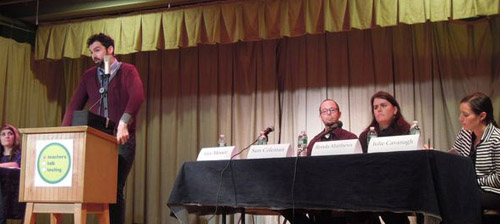Brooklyn organizing against high-stakes tests
The following article came to my attention and I think Substance readers want to add this to their information about the current struggles of the resistance to high-stakes testing. As readers already know, the movement Substance has called "The Resistance" for more than a decade has been spreading widely in the past couple of years.
 Brooklyn teacher Alex Messer describes the destruction of learning in New York's public schools caused by high-stakte testing at the December 3 forum.Brooklyn Teachers Blast Emphasis on Testing, Wednesday, December 04, 2013 - 04:00 AM. By YASMEEN KHAN
Brooklyn teacher Alex Messer describes the destruction of learning in New York's public schools caused by high-stakte testing at the December 3 forum.Brooklyn Teachers Blast Emphasis on Testing, Wednesday, December 04, 2013 - 04:00 AM. By YASMEEN KHAN
A group of veteran teachers described in detail Tuesday night (December 3, 2013) how an emphasis on standardized tests was sucking the joy out of the classroom, adding undue stress to students and educators themselves.
"The tests are kind of ruining what we love," said Sara Greenfield, a third-grade teacher at P.S. 321 William Penn in Park Slope. She said that the time needed to prepare for the tests has displaced experiential learning.
"At this point it's a luxury for most New York City teachers to choose to take their classes to a dance performance, instead of read about a dancer and answer multiple choice questions about that dancer," she said.
Greenfield and others spoke to parents and fellow teachers in the P.S. 321 auditorium at a forum under the umbrella of Teachers Talk Testing, a newly-formed group seeking to reduce the emphasis on testing in three ways: ending grade promotion tied to test scores; ending middle school and high school admissions tied exclusively to test scores; and revising the way test scores factor into school progress reports.
For some, the issue of over-testing was connected to the implementation of the Common Core learning standards. Tuesday's panel came at a time when the New York education commissioner, John King, has been holding community forums -- at times contentious -- around the state. The New York City forum has not been scheduled yet.
King recently defended the push for the Common Core -- and the new tests aligned to the standards, saying that too many students were graduating high school unprepared for college. But critics have said that the standards and tests are being pushed too fast, especially after less than one third of students statewide passed the tests last spring.
�There�s a lot of good things in the Common Core standards, and I think most good teachers would agree that we want to hold our students to high standards," said Alex Messer, a fourth-grade teacher at P.S. 321. "But the Common Core standards have come out quickly,� without enough time to work out the kinks, he said.
P.S. 321's principal, Liz Phillips, bluntly brought the problem with the Common Core back to testing. "The value of the Common Core has become totally tainted because of the tests," she said.
Teachers reported that despite their best efforts to avoid test prep, they felt it would be unfair to put students in a testing situation without familiarity with the format and types of questions they would need to answer. And, despite an effort to downplay the importance of the tests, students were fully aware of the stakes involved, they said.
"Children, contrary to popular belief, are observant," said Sam Coleman, a third-grade teacher at P.S. 24 in Sunset Park. "They pick this stuff up."
Ronda Matthews, a fifth-grade teacher at P.S. 321, said watching her students struggle with the tests was painful. "The high-stakes associated with testing has such unforgiving consequences for my students and myself," she said. "I find it hard to stomach that such extreme decisions and labels are placed on students and teachers alike based on a few days of a high-pressure situation."
Now, with student performance on state tests also factoring into teacher evaluations, the system may not only weed out ineffective teachers but also discourage highly effective teachers as well, said Julie Cavanagh, a special education teacher at P.S. 15 Patrick F. Daly in Red Hook.
"I find myself subjecting these kids that I love to this thing that's not good for them, doesn't benefit them, doesn't give me the information that I need -- which is supposed to be the purpose of assessments," she said. "It is the definition of insanity."
YASMEEN KHAN
Yasmeen Khan is an associate producer covering education. You can find her stories on the air and on SchoolBook.org, WNYC�s education website.

